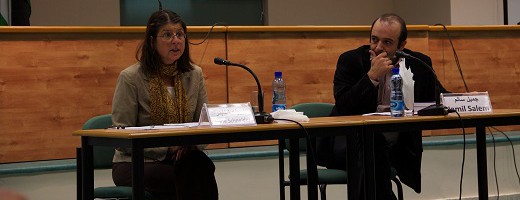The Discourse about the Convention on the Elimination of Discrimination Against Women (CEDAW) in the Islamic Republic of Iran: Voices of Female Jurists
The presentation was made by Irene Schneider, Professor for Arabic Studies and Islamic Law at the University of Göttingen, Germany.
In his opening statement, IoL Director Dr. Jamil Salem introduced Professor Schneider. Currently she is a member of the Senate, Göttingen. Her main fields of research are Islamic law, especially family law and public law, early Islamic history, gender, etc.
At first, Professor Schneider introduced the 1979 Convention on the Elimination of All Forms of Discrimination against Women (CEDAW). Article (1) of the Convention defines discrimination against women as “any distinction, exclusion or restriction made on the basis of sex which has the effect or purpose of impairing or nullifying the recognition, enjoyment or exercise by women, irrespective of their marital status, on a basis of equality of men and women, of human rights and fundamental freedoms in the political, economic, social, cultural, civil or any other field.”
The question of the adaptation/implementation or the arrival of international human rights conventions in different societies, states and cultures is a complex process, which is not easily understood. An example of the discussions about the CEDAW is the Islamic Republic of Iran.
According to Professor Schneider, states ratifying international conventions, including the CEDAW, are required to enshrine gender equality into their national legislation. In the process of national legislation, the question arises: How are the articles of these conventions, here specifically CEDAW, turned into national law? How is, for example, the term of "gender equality" understood and interpreted?
In the context of Iran’s experience, Professor Schneider analysed certain key words, such as feminism, Islamic jurisprudence (Fiqh) and the use of terminologies, including gender equality. She mainly focused on the related concept of “gender equality” in an attempt to understand which gender roles and gender concepts - and gender hierarchies - are connected with it.
Providing an analysis of some Iranian jurists, Professor Schneider explained why the CEDAW is not in effect in Iran. In this context, Mortazā Moṭahhārī, an important and influential Iranian thinker and ideologist who died in 1979, rejects Western criticism of Islam in relation to lack of equality of rights between Muslim men and women, on the grounds that the discourse of gender equality, far from being a universal principle, was a Western product and therefore irrelevant to Islam. Moṭahhārī advocates “equality” while explicitly speaking out against “similarity” or “resemblance”. He says that “equality is the equal legal rights of men and women and that no legal privileges are given.” According to Moṭahhārī, it is self-evident that “equality” is part of human nature and that it is to be counted as a human right. He further states that “Islam is not opposed to the equality of the rights of men and women; it is opposed to the similarity of their rights.” For example, he argues that polyandry is against human nature whereas polygyny is accepted by Islam. To this avail, Professor Schneider believed that Moṭahhārī’s advocacy ran counter to the CEDAW.
Professor Schneider cited two female jurists in the Islamic Republic of Iran: Farība ‘Alāsvand, a professor at Zahra-University (ḥawże) in Qom, and Shahīndokht Mawlāverdī, a jurist well versed in family law and recently appointed by President Rouhani as the new Secretary of State in charge of Women’s Affairs.
Like Moṭahhārī, ʿAlāsvand argues that other concepts should be referenced to investigate gender roles. She concludes that “similarity” between men and women cannot be accepted. Her reasoning is that there are biological and psychological differences between the sexes that cannot be denied. These differences are confirmed in the Qur’an. She invokes the Quranic verse 4:3 on polygamy, according to which a man can be married to up to four women at the same time. This does not also apply to women. That ‘Alāsvand accepts polygyny means of course that she automatically rejects the concept of gender-equality as laid down in the Convention. Islam accepts equality, but what is in the Convention is not (Islamic) equality. She concludes that the concept of gender relation in the Convention is to be identified with the term similarity coined by Moṭahhārī. An examination of the convention would show, she argues, the key terms to be “the absolute equality between men and women”. Rejecting the Convention, ʿAlāsvand concludes that Iran is not willing to endorse the CEDAW. Relevant CEDAW terms are far more complex.
On the other hand, Mawlāverdī argues that CEDAW could be accepted from an Islamic point of view, or better: the point of view of an Islamic state. She explores the important meaning of public national welfare (maṣlaḥat) for the Iranian state and defines it as a guideline for the government. According to Mawlāverdī, the CEDAW can be endorsed and integrated into the Iranian context. Terminology, such as “gender” and “gender equality”, can be translated and accommodated. She points to other Islamic countries which have signed CEDAW. Mawlāverdī would see Iran in danger of isolation on an international level because the state has not yet ratified CEDAW.
In the ensuing discussion, participants highlighted significant campaigns launched by the Iranian feminist movement in order to change laws for the benefit of women. In addition to making clear the difference between sex and gender, discussants advocated development of personal status laws in Palestine. Organised in partnership with the Konrad Adenauer Stiftung - Ramallah Office, the legal encounter brought together many interested researchers and representatives of relevant organisations.











